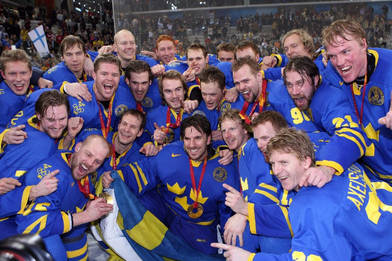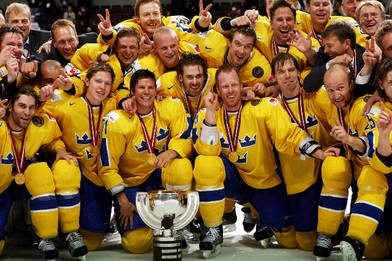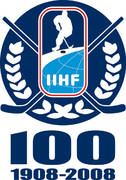

Story #8 Sweden’s unique double, Olympics & WorldsFebruary & May, 2006 – Turin & Riga
The hockey world changed most dramatically and recently in the 1990s. First, the Soviet Union crumbled, after which Czechoslovakia split in two, and then NHLers started to compete at the Olympics. The result produced an astounding parity among the top teams. Consider that the “Canadian era” lasted from 1920 to 1961 and the “Soviet era” from 1962 to 1990. That is, these countries dominated those periods of time in a way that is unimaginable today.  In fact, Tre Kronor won three times and lost twice in the preliminary round. The first loss was a convincing 5-0 win by the Russians and the second a somewhat tainted 3-0 loss to Slovakia. This latter loss created controversy because Sweden’s team knew going into the game that if it lost it would play Switzerland in the quarter-finals; if it won, it would likely face Canada.  Riga 2006 changed all that. The Swedes lost only once in the first two rounds, a 6-3 loss to Russia in the Qualifying Round, and in the quarter-finals they faced the United States, a team, as usual, that was full of enthusiastic young talent but, at this level, undermanned and outmatched. The Swedes hammered USA 6-0 and then beat Canada 5-4 in the semi-finals, a game in which they built up a lead only to see Canada mount an impressive comeback which fell just short. About the Top 100 StoriesAs part of the IIHF's 100th anniversary celebrations, www.IIHF.com is featuring the 100 top international hockey stories from the past century (1908-2008). Starting now and continuing through the 2008 IIHF World Championships in Canada, we will bring you approximately three stories a week counting down from Number 100 to Number 11.
The Final Top 10 Countdown will be one of the highlights of the IIHF's Centennial Gala Evening in Quebec City on May 17, the day prior to the Gold Medal Game of the 2008 World Championship.
These are the criteria for inclusion on this list: First, the story has to have had a considerable influence on international hockey. Second, it has to have had either a major immediate impact or a long-lasting significance on the game. Third, although it doesn't necessarily have to be about top players, the story does have to pertain to the highest level of play, notably Olympics, World Championships, and the like. The story can be about a single moment — a goal, a great save, a referee's call — or about an historic event of longer duration — a game, series, tournament, or rule change. |
 Click here for the 100 Top Stories
|
|






